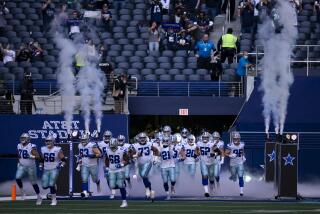COVID-19 affects college football powerhouses and their fans
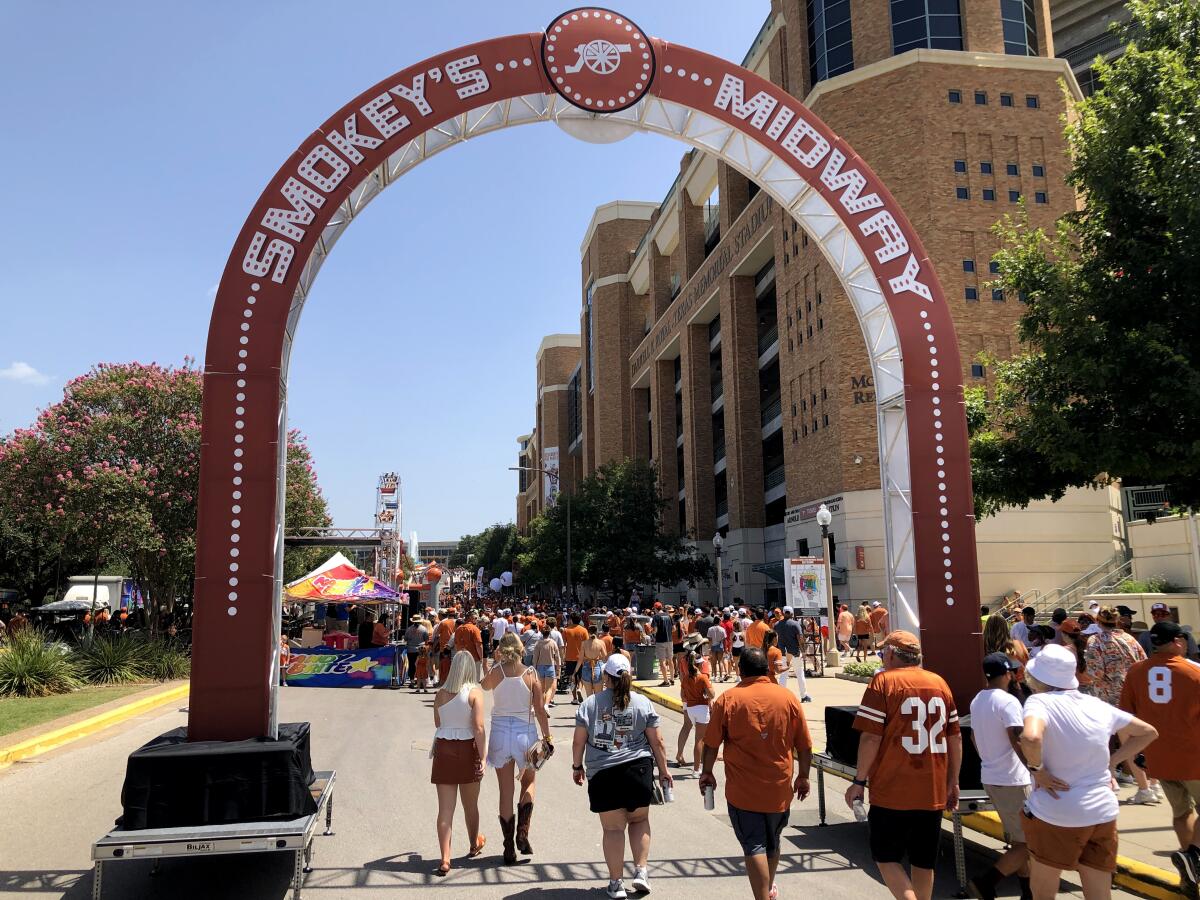
- Share via
AUSTIN, Texas — With the Texas Longhorns hosting the Louisiana Ragin’ Cajuns for their season opener Saturday, it didn’t matter to Orlando Candelaria that hospitals across the state are packed with COVID-19 patients, that just 47% of Texas residents are vaccinated and that the governor, who’s recovering from COVID-19, has banned mask mandates.
Candelaria, 37, just had to suit up — maskless — in his burnt orange jersey and sunglasses, get to the Bevo Boulevard tailgate area outside the stadium and shout “Hook ’Em, Horns!”
“We’re trying to get back to normal: The game, the fans, Bevo Boulevard, seeing the crowd start coming together,” Candelaria, who has been vaccinated, said as he stood amid the pregame throng. “Once you get those 100,000 people in that stadium, crowded, cheering, it’s an experience that will never get old.”
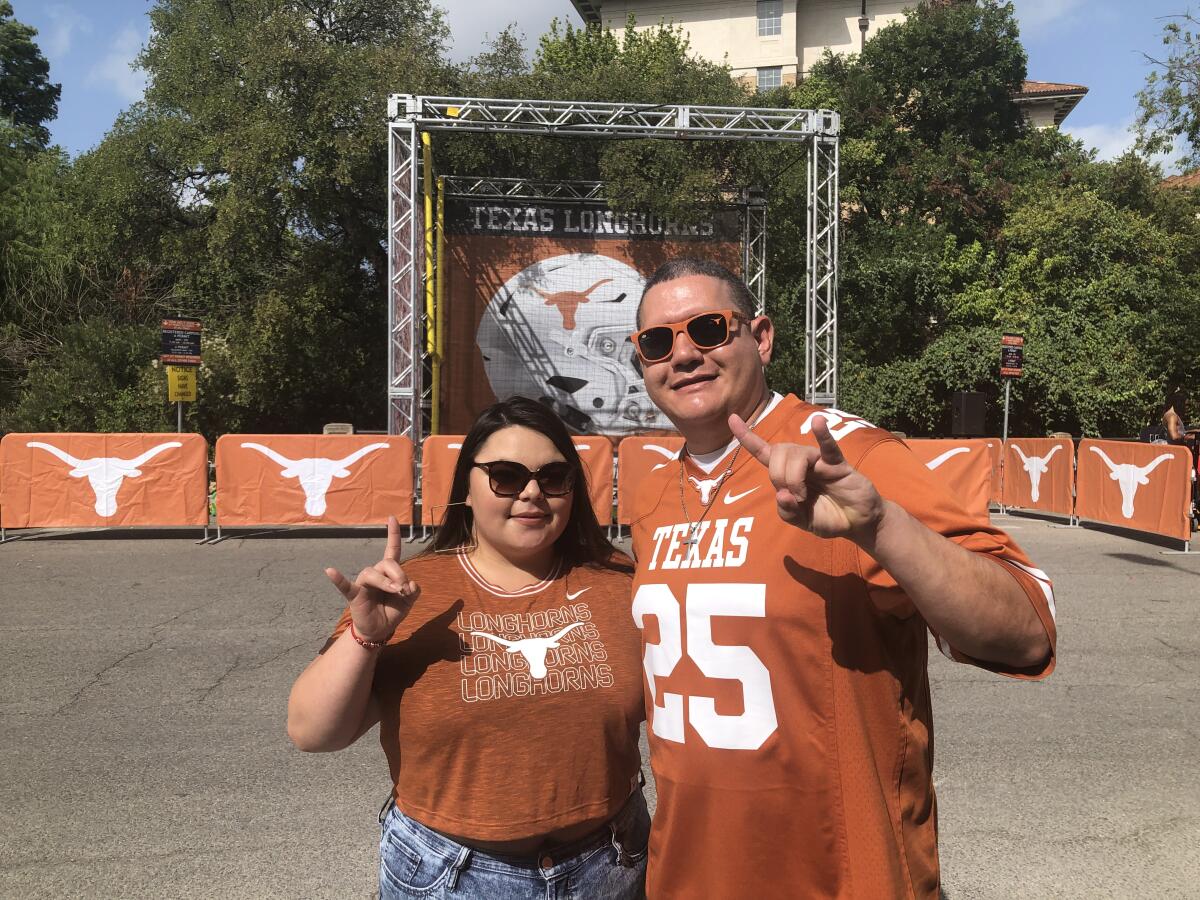
Last year, college football was a letdown for fans in Texas and across the nation. COVID-related cancellations in the five elite college football conferences, known as the Power Five, meant 285 games compared with 453 in 2019. Capacity limits for many of the games that were played have left students, alumni and other football fanatics desperate to resume tailgating and other in-person traditions this weekend.
But COVID-19 still complicates game day, nowhere more than in the South. COVID-19 vaccination rates have lagged and hospitalizations have surged, filling intensive care units in Alabama, Louisiana, Florida, Texas and other states that are home to powerhouse college football teams. The Centers for Disease Control and Prevention urged unvaccinated people not to travel for the holiday weekend, but many have ignored the advice. Though football conferences consulted medical advisors during the pandemic and responded to varying degrees, Southern schools in the Big 12 and Southeastern Conference are home to some of the least restrictive tailgating and in-stadium practices in the country.
Candelaria is acutely aware of the risks: A medical assistant, he got vaccinated after surviving a bout of COVID-19 last year. He said he planned to wear a mask inside the stadium’s enclosed hallways, bathrooms and concession areas, but with temperatures outside expected to climb to 100 degrees, it would be difficult to wear a mask among outdoor crowds, he said.
Kari McKenzie traveled from east Texas to attend her first Longhorns game with her husband, a University of Texas alumnus, or “Texas Ex,” and their two daughters. The parents, both high school teachers, were vaccinated, but the girls — ages 8 and 4 — are not old enough to get the shots.
“Our families are not happy with us,” said McKenzie, 45, wearing a Longhorns jersey and game-day hat as her family explored attractions along Bevo Boulevard, named after the University of Texas mascot, including a zip line and Ferris wheel geared toward children.
She said her mother had asked, “Why are you taking my babies around all those people?”
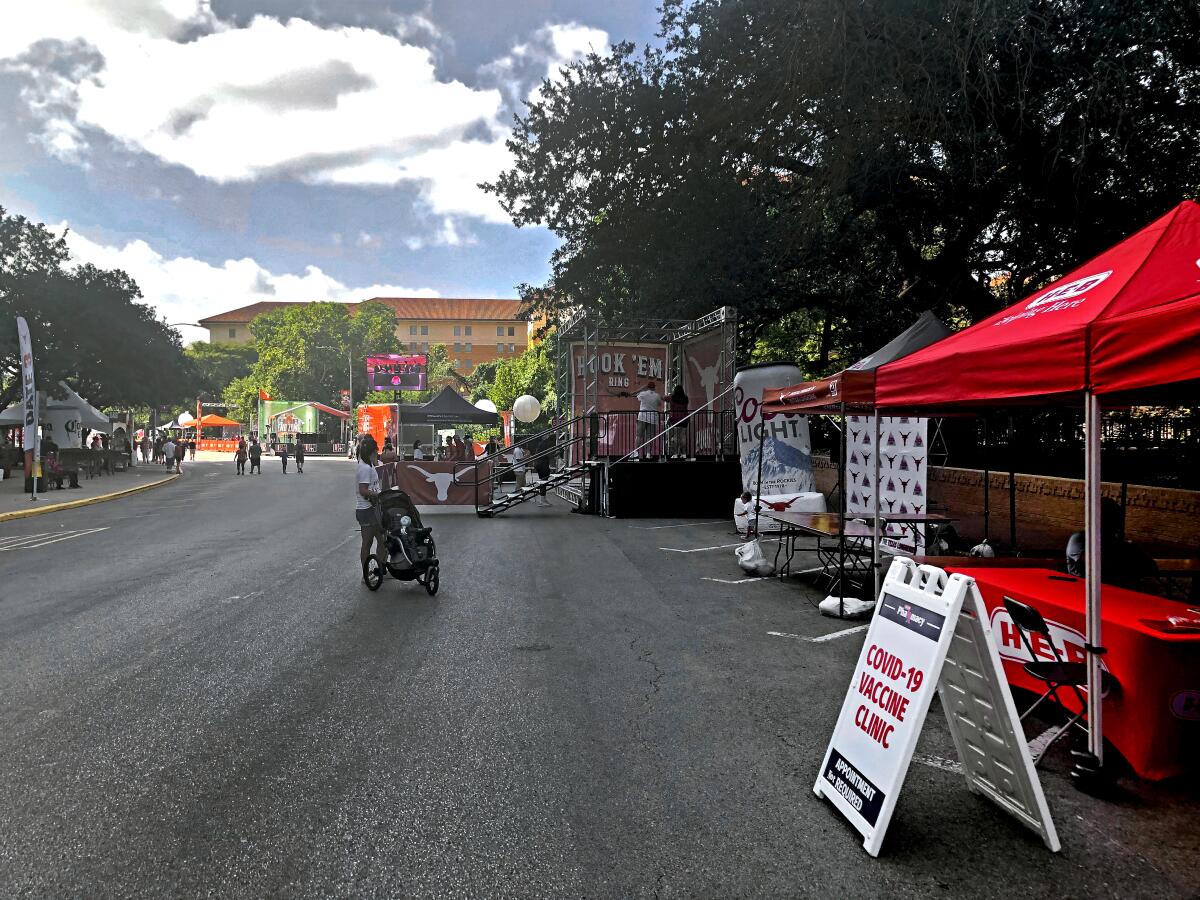
Pediatric coronavirus cases have surged in Texas, especially since students returned to school. McKenzie knows students and teachers who have caught the virus already this year.
“Our kids are in school every day next to other kids and they’re not required to wear a mask — they’re more likely to get it there,” McKenzie said. “We can’t live in a bubble. We did bring our masks, and if we’re crammed in with people, we’ll put them on.”
Along the nearby pedestrian boulevard, between barbecue stands, an enormous inflated longhorn and a mechanical bull, there was a new feature: a COVID-19 vaccination site. Amid pregame updates, an announcer could be heard reminding fans via outdoor speakers that “masks are strongly recommended for unvaccinated individuals.”
“I would gladly get vaccinated to support my team,” said Mark Fontenot, 37, a Ragin’ Cajuns fan who’d been vaccinated before traveling from Lafayette, La., to attend Saturday’s game because, he said, “we can’t live in fear.”
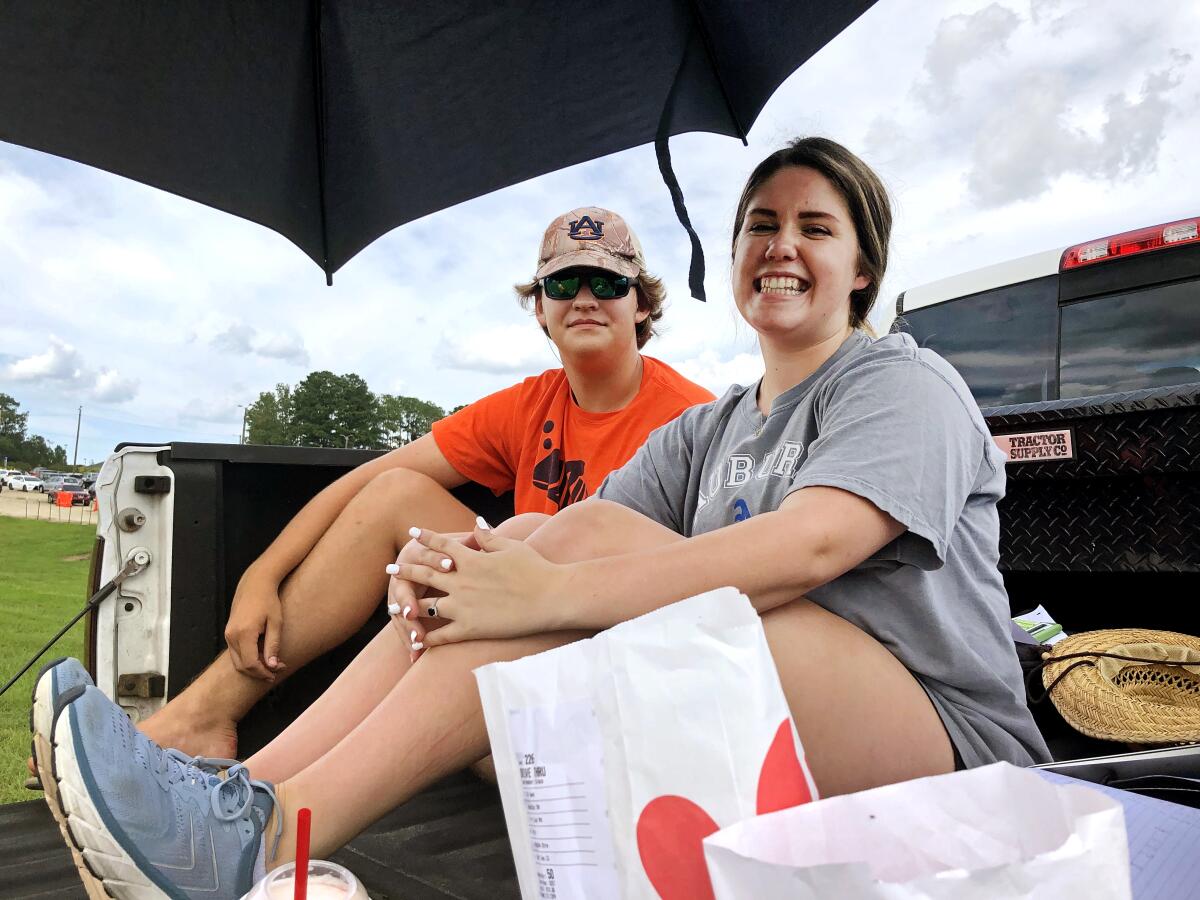
In Alabama, where less than 39% of residents are fully vaccinated and many hospitals are overwhelmed with more than 880 COVID-19 patients across the state in ICUs, many Auburn University fans and alumni were joyous as they pulled their RVs and pickup trucks into a field south of the stadium in Auburn on Friday afternoon ahead of the Tigers’ game against the University of Akron Zips. Last year, tailgating wasn’t allowed on the college campus due to the pandemic, and the 87,400-seat stadium was limited to 20% capacity.
“Just being around all these people who care about the same thing as much as you, it’s just so exciting,” said Lily Moreman, an unvaccinated 18-year-old first-year student guarding a prime tailgating spot for the Tiger Prowler fan group.
Moreman said she might wear a bandanna inside the stadium. But she wasn’t too worried: She had already tested positive for the coronavirus and become sick two weeks ago during sorority recruitment — and has since tested negative.
Ginger Davis, a retired lawyer from Ooltewah, Tenn., had mixed feelings about attending the game.
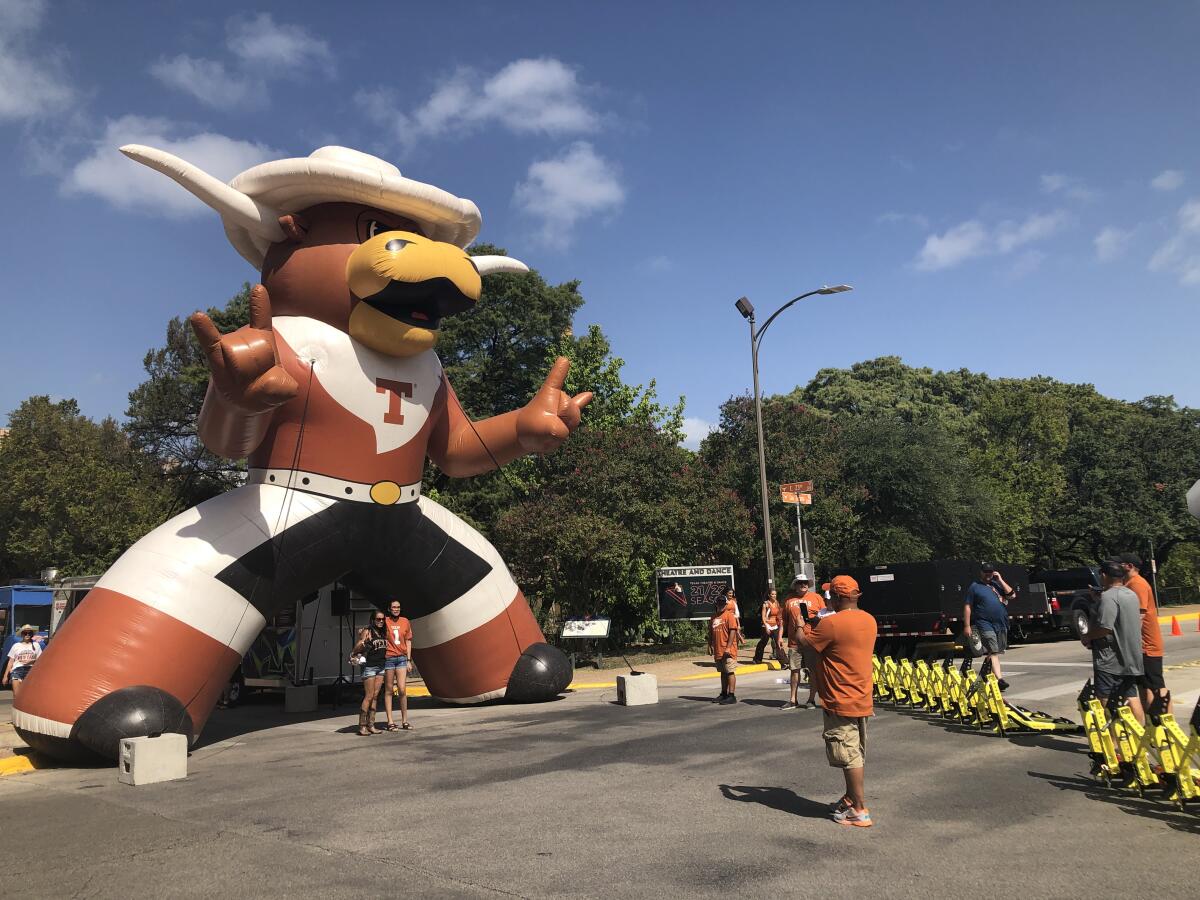
“It’s great to be back — we missed last year entirely — but I’m very nervous about the stadium,” Davis said as she decorated the area around her RV on Friday afternoon with blue and orange solar lights.
Both she and her husband, Neil Davis, 64, a retired economist, were vaccinated and planned to wear masks to the game. Ginger said she cares for her elderly parents and did not want to put them at risk. She planned to arrive at the game either very early or very late, avoid taking the elevator and mask up throughout.
Larry Molt, an associate professor and director of Auburn’s Neuroprocesses Research Laboratory, said he and other tailgaters had replaced their traditional barbecue potluck with wrapped sandwiches and eliminated the frozen drink machine they used to make “Tiger-ritas.”
But Molt, who was vaccinated and planned to wear a mask inside the stadium, still wasn’t sure if it was safe.
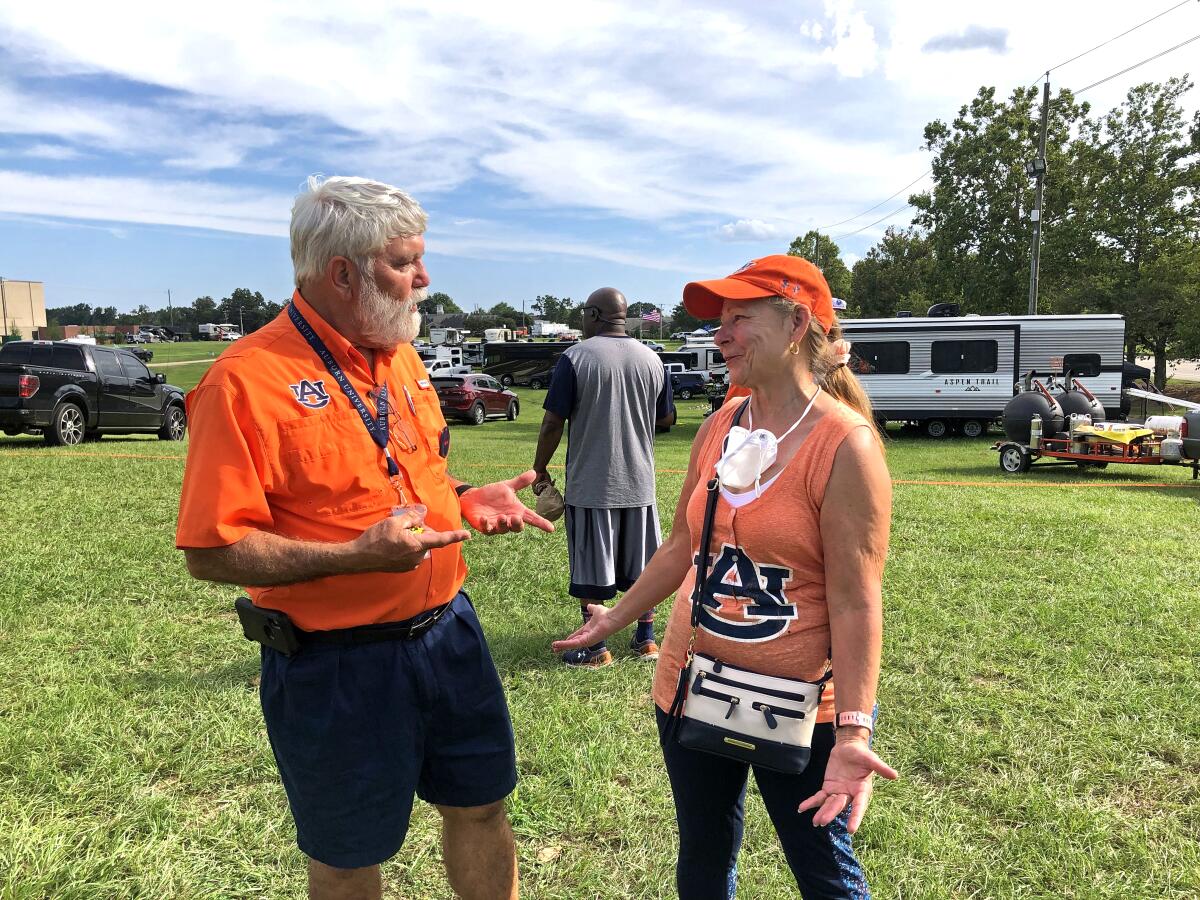
“This has every potential to be a superspreader event,” he said. “If it looks like it’s risky, we’ll come back here and watch it on TV.”
Many universities are not requiring proof of vaccination or a negative coronavirus test to enter stadiums. A handful of institutions, such as Oregon, Oregon State and Louisiana State, are requiring proof of vaccination or a negative test for those older than 12 to attend football games, said Rylie Martin, assistant director of the College Crisis Initiative at Davidson University in North Carolina. The remaining colleges are requiring masks only in indoor spaces within the stadium, such as restrooms and retail areas, or encouraging fans to wear masks.
Nationally, about 70% of colleges, universities and community colleges are requiring, incentivizing or encouraging students to get vaccinated, said Chris Marsicano, the director of the Davidson initiative. Only about a quarter of institutions require students to be vaccinated, Marsicano said.

Colleges in Florida, Oklahoma, Texas and some other states were prevented by lawmakers from requiring vaccinations or masks. In Louisiana, Tulane University required those attending the season opener against Oklahoma to present proof of COVID-19 vaccination or a negative test and to wear masks. But Hurricane Ida forced it to move its first game to Oklahoma, which has no such mandate.
Football powerhouses such as Texas and Auburn were taking a cue from Republican state leaders and leaving it up to fans to decide whether to protect themselves. The University of Texas has encouraged people to get vaccinated, wear masks indoors and socially distance, but it’s not enforcing any requirements.
“Our strategy all along has largely been one of focusing on individual responsibility for all of our community members,” said professor Art Markman, who leads the university’s COVID-19 planning group.
Markman said that, in part “because of the broader political context in Texas, we’ve never been about heavy rules with a lot of punishments.”
Instead, Markman said, the university has been urging those on campus to protect each other.
“We’re going to reinforce those same messages of protecting the Longhorn community among those coming to the games,” he said. “College football at a school like the University of Texas is a central part of the memories of our students while they’re here. So to the extent we can do this in a safe way, I think it’s important.”
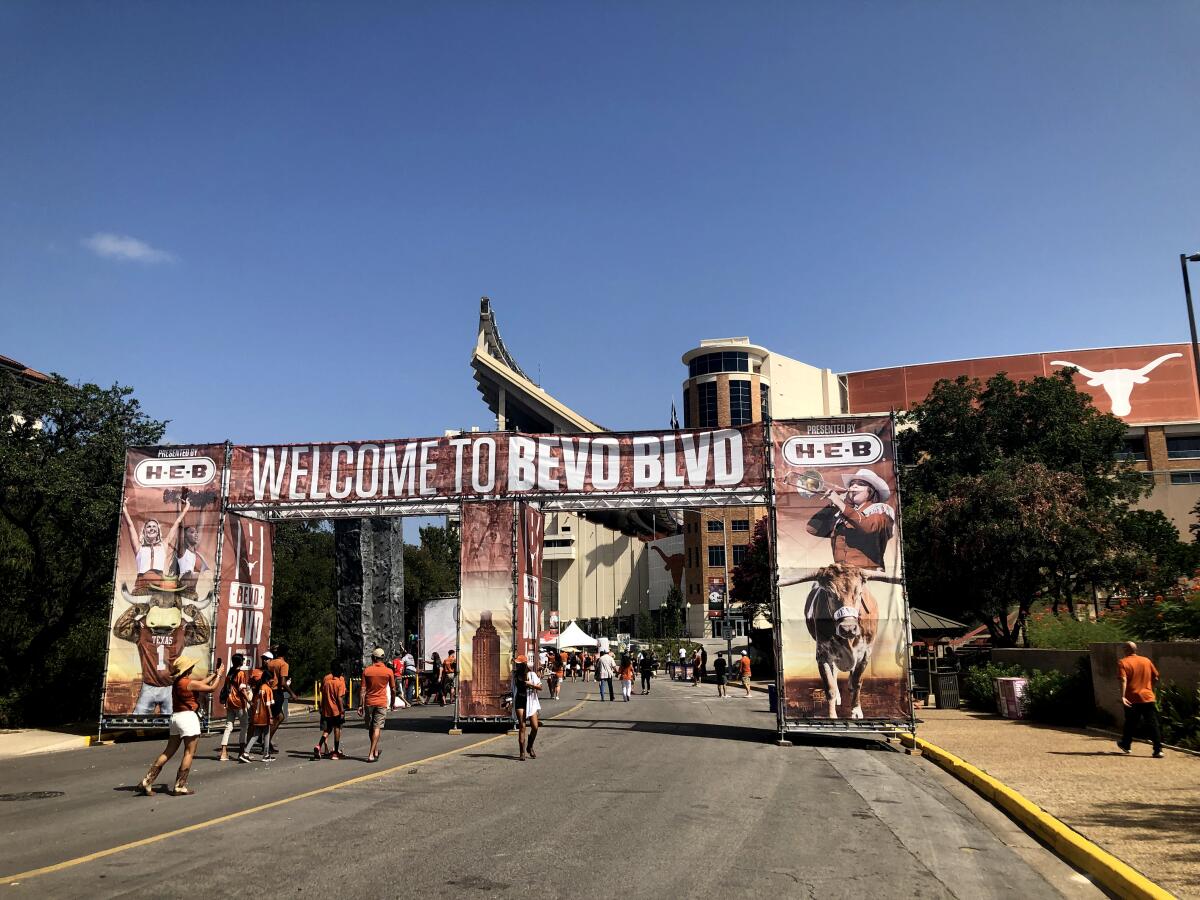
It’s also important to the school’s bottom line after last year’s abbreviated season, said Victor Matheson, a sports economist at the College of the Holy Cross in Worcester, Mass.
“The typical team played fewer games and attendance was way down, mainly because of restrictions on capacity, including a bunch of places that let no one in the door,” he said, decreasing overall attendance at top-level college football games by 85%.
Before the pandemic, Texas was the top-grossing college football program in the country, with $200 million in revenue in 2019. That was probably reduced by about $75 million last year, Matheson said, while smaller schools lost about $40 million on average. Texas’ athletics department just announced more than $13 million in athletic department cuts, layoffs and furloughs last week to offset pandemic revenue losses.
As long as schools don’t impose restrictions, Matheson predicted, fans will consistently attend this season.
“The majority of the big college football programs tend to be in places where we’ve seen the general public not caring about [COVID-19] restrictions or vaccine requirements,” in the South and Midwest, Matheson said, with the exception of California schools.
In the South, he said, “people are going to go out to the games whether COVID is raging or not. That’s not good for public health, but it’s good for Texas and Alabama’s bottom line.”
Some public health experts said such college football games put fans at risk, even those in open-air stadiums.
“When you start packing people together like sardines, the likelihood of transmission, even at an outdoor setting, goes up substantially,” said Jason Salemi, an associate professor of epidemiology at the University of South Florida College of Public Health in Tampa.
The risks were magnified in states such as Alabama and Texas with relatively low vaccination rates, Salemi said.
Dr. Cameron Wolfe, an infectious disease doctor at Duke University who chairs the Atlantic Coast Conference’s medical advisory team, said the conference is trying to “be sensible stewards of people’s interest in sports and still be conscious that we’re in a pandemic that’s rising in many parts of the country where our healthcare infrastructure is struggling.”
Wolfe said when patients ask him whether it’s safe to go to college football games, he tries to gauge their comfort level in unmasked crowds, and also where they plan to watch the game.
“Sitting outdoors in a breezy stadium worries me less than hundreds of people packed into a sports bar,” he said.
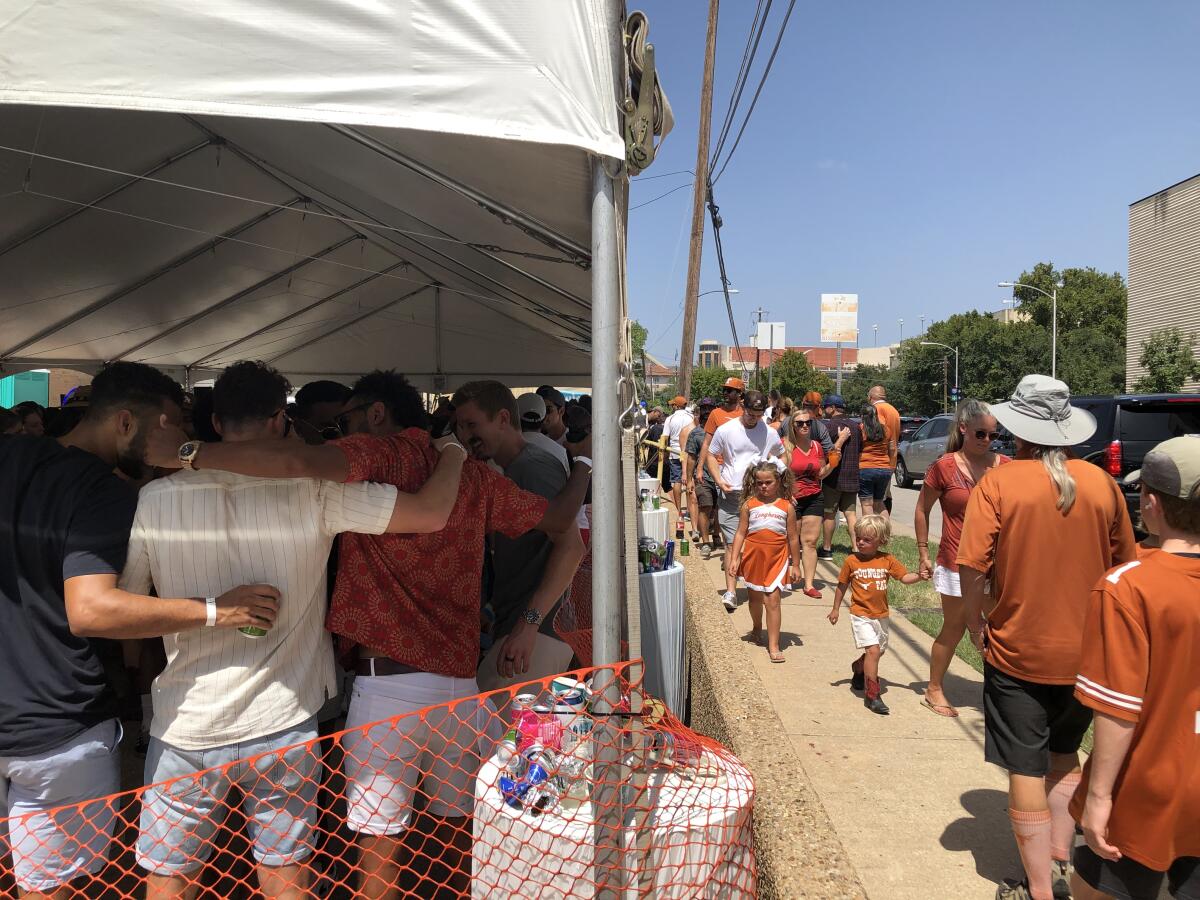
On his way to the stadium, Benjamin Lara Jr. — fully vaccinated with a mask in his pocket — passed a tent packed with scores of unmasked fans and called to his friends and family, “Superspreader!”
Then he spotted a cousin in the tent, and had to stop and chat — without masks as the temperature approached 100 degrees.
“I’m still wary,” said Lara, 35. “It’s tricky, being so hot.”
“The mask thing is over!” shouted a man passing him.
Lara shook his head. His uncle died of COVID-19 last year, and his mother was hospitalized with the virus. Lara, who works for a beer distributor, still wears a mask when he visits bars for work.
For some, he said, “Reality doesn’t set in until you have a family member die of it. The world’s still divided.”
Some of the fans entering the stadium’s closed hallways and restrooms were unvaccinated, and few inside were masked, especially in concession areas.
Near the concession counters, Jessica Patterson, 33, an unvaccinated Army veteran, sipped a beer with her husband — a soldier who was required to get vaccinated — and their two children, ages 12 and 9, who were also unvaccinated.
Patterson said she hadn’t been vaccinated because “I’m skeptical. I’m waiting for more information.”
“We take precautions,” she said.
They had masks, although only her 12-year-old was wearing his.
Next to them, Frances Trimble, 78, also had her mask off to eat a hamburger. She’d driven four hours from east Texas to attend the game and remember her late husband, an alumnus who died last year.
“This is where he would want me,” she said. “I love my Longhorns.”
More to Read
Sign up for Essential California
The most important California stories and recommendations in your inbox every morning.
You may occasionally receive promotional content from the Los Angeles Times.
